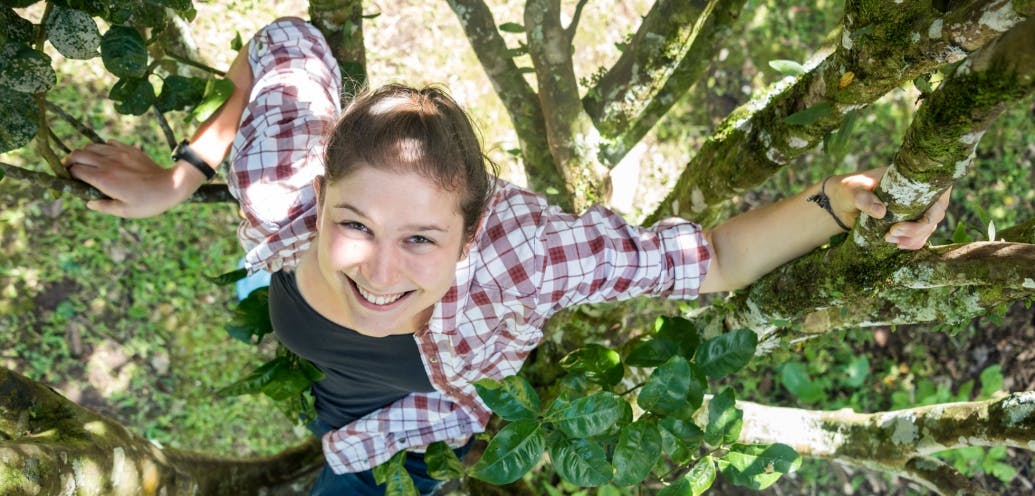On an average day, Michaela Rubenstein wakes up at 5:30 a.m. She helps milk the cows before a breakfast of coffee and gallo pinto (rice and beans), then leads tourists on a natural history hike or translates a coffee tour in the local community of San Luis.
A 2017 graduate of Seattle Pacific University, where she majored in ecology, Michaela currently works in the Monteverde Cloud Forest region of Costa Rica as a resident naturalist at the University of Georgia Costa Rica campus. After lunch, she works on the campus’ integrated organic farm and takes a late afternoon coffee break with the local staff to practice her Spanish conversation skills. Before dinner, staff, interns, and tourists typically join in a mejenga (pick-up soccer game). After dinner, she helps clean up in the kitchen and leads a night hike or a dance class before turning in for the night, prepared for more of the same the following day.
To gain a better understanding of her daily life as a resident naturalist in Costa Rica, SPU Voices asked Michaela to share more about her responsibilities, her team, and her most memorable experiences.
(Photos by Mariela Vásquez González)
Day in the life of a naturalist

Being a naturalist at the University of Georgia Costa Rica isn’t just about running around outside looking for cool animals and leading tours. There’s a lot of research to be done in our spare time to make sure research projects are moving forward. And just like any job, lots of emails are required to coordinate a large team of people and a constant influx of tourists. However, we’ve done a pretty good job of decorating by bringing nature into the office.
Down on the (organic) farm

Although I’m a resident naturalist, I also spend a good deal of my time working on the integrated organic farm and the stables. Feeding the chickens and collecting eggs is part of everyday routine. And nothing beats farm-fresh eggs in the morning, especially when you’ve helped to collect them yourself.
Vegetables fresh from the garden

The integrated organic farm is the heart of campus. Up to 30 percent of our food comes from the farm and it is all grown organically, with compost we make ourselves using materials such as banana leaves, food waste, and chicken and cow manure from around campus. Getting fresh vegetables for salads every day is definitely a blessing.
Another first-time experience in Costa Rica: milking a cow

Milking is one of my favorite parts of the day. We have a herd of three dairy cows right now that we milk twice a day and in total they produce 100 pounds of milk (or more!) every day. It’s so neat to see how the whole campus is connected from the stables, to the kitchen, to the very food we eat. It was really hard at first but now milking has become second nature.
Sí, las vacas pueden comprender el español

Bringing the cows in from the pasture is a daily routine. We whistle to them and sometimes they moo back in response. They also respond (most of the time) to our directions and commands in Spanish.
Breaking through the dark

Leading night hikes is one of my responsibilities as a resident naturalist, but in order to do it right, you need the correct gear. Having a good headlamp helps you find some neat stuff, especially insects hiding in the leaves and flowers of Stachytarpheta frantzii (Porterweed).
Good night from Monteverde

No day is complete without a good book. My most recent literary conquest has been Harry Potter y La Piedra Filosofal. It was the first book I ever started (and finished) completely in Spanish.




